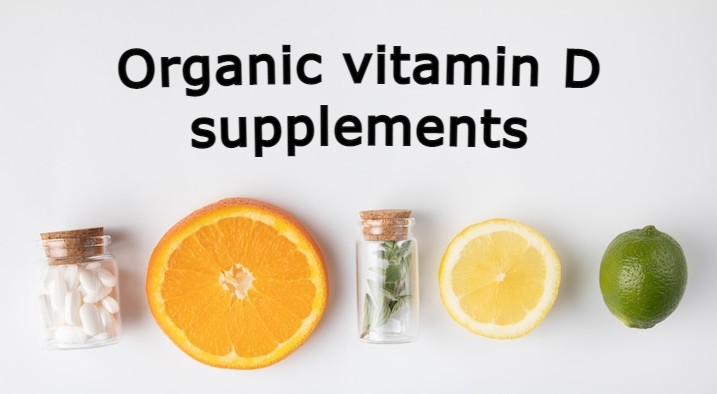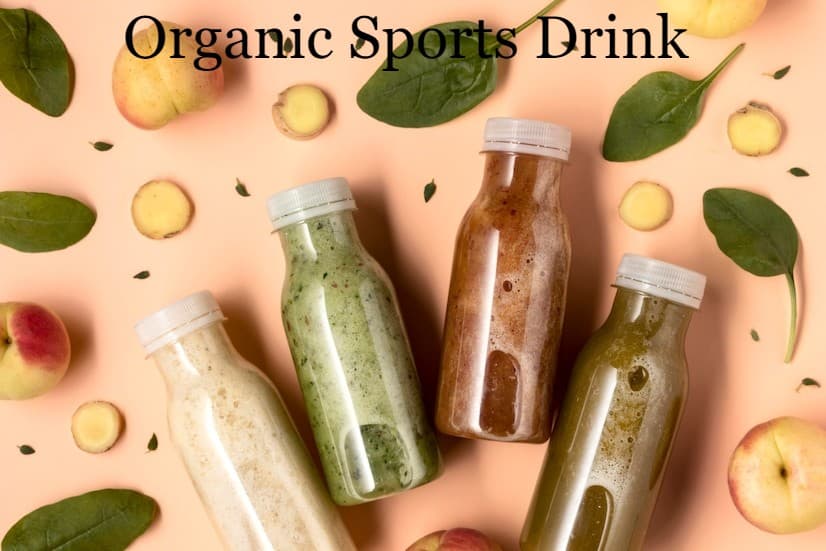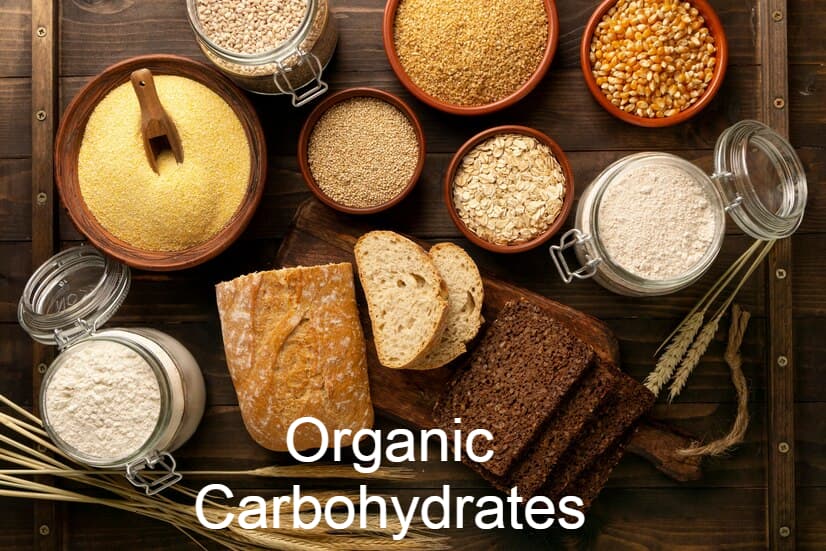Organic sports nutrition for runners
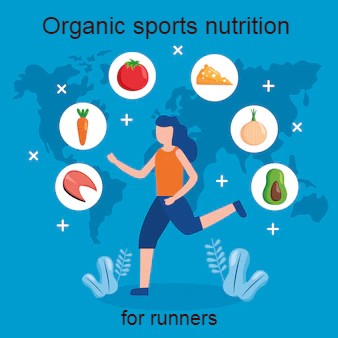
Proper nutrition plays a pivotal role in the success and well-being of runners. Whether you’re a seasoned marathoner or a casual jogger, the food you consume has a direct impact on your performance and recovery. Think of your body as a finely tuned machine, and nutrition as the fuel that keeps it running smoothly. Just as a car requires high-quality gasoline to perform at its best, runners need a balanced and nutrient-rich diet to reach their peak potential. While training and dedication are crucial, neglecting the nutritional aspect can undermine all your efforts. Therefore, understanding the significance of nutrition and its ability to optimize your running performance and aid in swift recovery is key to becoming a stronger and more resilient runner.
Amidst the ever-growing health-conscious movement, organic sports nutrition has emerged as a popular approach for athletes, including runners, who are looking to optimize their diet with the highest quality and most natural food options available. Organic foods are cultivated without the use of synthetic fertilizers, pesticides, growth hormones, or genetically modified organisms (GMOs). Instead, organic farming relies on sustainable practices that promote soil fertility, biodiversity, and environmental preservation. By embracing organic sports nutrition, runners can tap into the potential benefits of consuming nutrient-dense and chemical-free foods that support their overall health and athletic performance. From fruits and vegetables to whole grains, lean proteins, and healthy fats, organic foods provide a nourishing foundation for runners seeking optimal nutrition and a competitive edge.
In this article, we delve into the realm of organic sports nutrition and uncover the multitude of benefits it offers to runners. By incorporating organic foods into your diet, you can enhance your nutrient intake, reduce exposure to harmful chemicals, support sustainable farming practices, and experience improved digestion, energy levels, and recovery. We will explore key organic foods that should be part of a runner’s diet, including fruits, vegetables, whole grains, lean proteins, and healthy fats, and discuss their specific contributions to running performance. Furthermore, we will provide practical strategies to help you seamlessly incorporate organic sports nutrition into your daily routine, addressing concerns such as cost, sourcing, labeling, and seasonal availability. By the end of this article, you will have a comprehensive understanding of the benefits and strategies of organic sports nutrition, empowering you to make informed choices and fuel your running journey with the nourishment it deserves.
| Fact | Description |
|---|---|
| Natural Ingredients | Organic sports nutrition focuses on using natural, organic ingredients derived from whole foods. |
| Clean Fuel | Organic products provide clean fuel without artificial additives, chemicals, or synthetic ingredients. |
| Sustained Energy | Organic sports nutrition offers sustained energy through plant-based proteins, whole grains, and fruits. |
| Muscle Repair and Recovery | Organic options support muscle repair and recovery with nutrient-rich ingredients for post-run nourishment. |
| Easy Digestibility | Organic products are often more easily digestible, reducing the risk of gastrointestinal discomfort during runs. |
| Environmental Sustainability | Choosing organic sports nutrition supports sustainable farming practices and reduces environmental impact. |
| Tailored for Runner’s Needs | The market offers a wide range of organic products specifically designed to meet the needs of runners. |
| Performance Enhancement | Organic sports nutrition can optimize running performance, enhancing endurance, strength, and recovery. |
| Nutrient-Rich and Vitamin-Packed | Organic options are rich in essential nutrients and vitamins, supporting overall health and well-being. |
| Long-Term Health Benefits | Organic sports nutrition promotes long-term health benefits, contributing to improved overall fitness and vitality. |
The impact of organic food on overall health and performance.
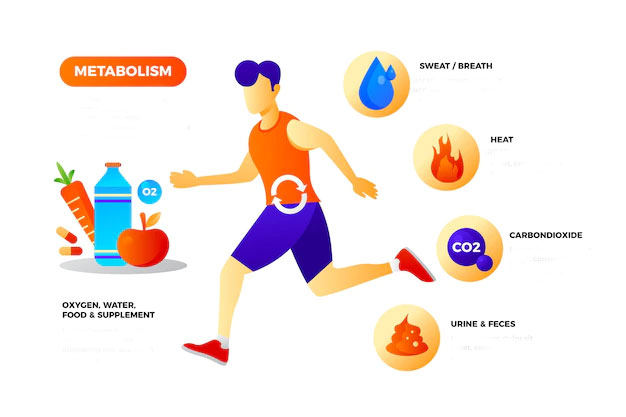
The impact of organic food on overall health and athletic performance cannot be overstated. Organic produce, for instance, tends to be higher in essential nutrients, such as vitamins, minerals, and antioxidants, as organic farming methods prioritize soil health and biodiversity. This nutrient density can contribute to improved recovery, enhanced energy levels, and a stronger immune system, all of which are crucial for athletes looking to excel in their respective sports. Additionally, by avoiding the consumption of GMOs and pesticides, athletes reduce their exposure to potentially harmful substances that may negatively affect their long-term well-being.
Importance Of Nutrition In Supporting Runners’ Performance And Recovery
Proper nutrition plays a pivotal role in the success and well-being of runners. Whether you’re a seasoned marathoner or a casual jogger, the food you consume has a direct impact on your performance and recovery. Think of your body as a finely tuned machine, and nutrition as the fuel that keeps it running smoothly. Just as a car requires high-quality gasoline to perform at its best, runners need a balanced and nutrient-rich diet to reach their peak potential. While training and dedication are crucial, neglecting the nutritional aspect can undermine all your efforts. Therefore, understanding the significance of nutrition and its ability to optimize your running performance and aid in swift recovery is key to becoming a stronger and more resilient runner.
Quality in Organic Foods For Runners

When it comes to sports nutrition for runners, the quality and nutrient content of the food they consume play a crucial role in their performance and overall health. Organic sports nutrition offers a significant advantage in this regard. Organic foods are grown without the use of synthetic fertilizers, genetically modified organisms (GMOs), or artificial additives. Instead, they rely on natural and sustainable farming practices that prioritize soil health and biodiversity. As a result, organic foods tend to have higher levels of essential nutrients, such as vitamins, minerals, and antioxidants. For runners, this means they can enjoy enhanced nutritional benefits from their organic diet, which can support muscle recovery, strengthen the immune system, and promote overall well-being.
Improved Digestion and Nutrient Absorption
Efficient digestion and optimal nutrient absorption are vital for runners to fuel their bodies effectively. Organic sports nutrition can offer significant benefits in this area. Organic foods are typically free from artificial additives, preservatives, and synthetic growth hormones, which can disrupt the digestive process and lead to gastrointestinal issues. Furthermore, organic farming practices prioritize the health of the soil, resulting in crops that are richer in beneficial microorganisms and enzymes that aid digestion. By consuming organic foods, runners can promote a healthier gut microbiome, improve nutrient absorption, and reduce the risk of digestive discomfort during their training and races.
Boosted Energy Levels and Reduced Inflammation

For runners, maintaining high energy levels and minimizing inflammation are critical for optimal performance and quick recovery. Organic sports nutrition can play a valuable role in achieving these goals. Organic foods are known to contain higher levels of antioxidants, which help combat oxidative stress and reduce inflammation in the body. This can result in faster recovery times, reduced muscle soreness, and improved overall endurance. Additionally, organic foods are often free from artificial sweeteners and excessive sugars, which can lead to energy crashes and spikes in blood sugar levels. By choosing organic sports nutrition, runners can fuel their bodies with wholesome, nutrient-dense foods that provide sustained energy and support a balanced inflammatory response, ultimately enhancing their running performance.
Organic fruits and vegetables for essential vitamins and minerals
When it comes to organic sports nutrition for runners, incorporating a wide variety of organic fruits and vegetables is crucial. These colorful powerhouses are packed with essential vitamins, minerals, and antioxidants that support overall health and performance. Organic fruits like berries, oranges, and bananas offer a natural source of carbohydrates, vitamins, and electrolytes, providing a quick energy boost and aiding in hydration. Leafy greens such as spinach and kale are rich in iron, which is vital for oxygen transport to the muscles. Additionally, organic vegetables like broccoli, carrots, and bell peppers provide a spectrum of nutrients, including vitamin C, potassium, and fiber, which promote immune function, muscle recovery, and digestive health. By choosing organic options, runners can ensure they are fueling their bodies with produce free from synthetic pesticides and additives, maximizing the nutritional benefits they receive.
Runner’s Beet Powder
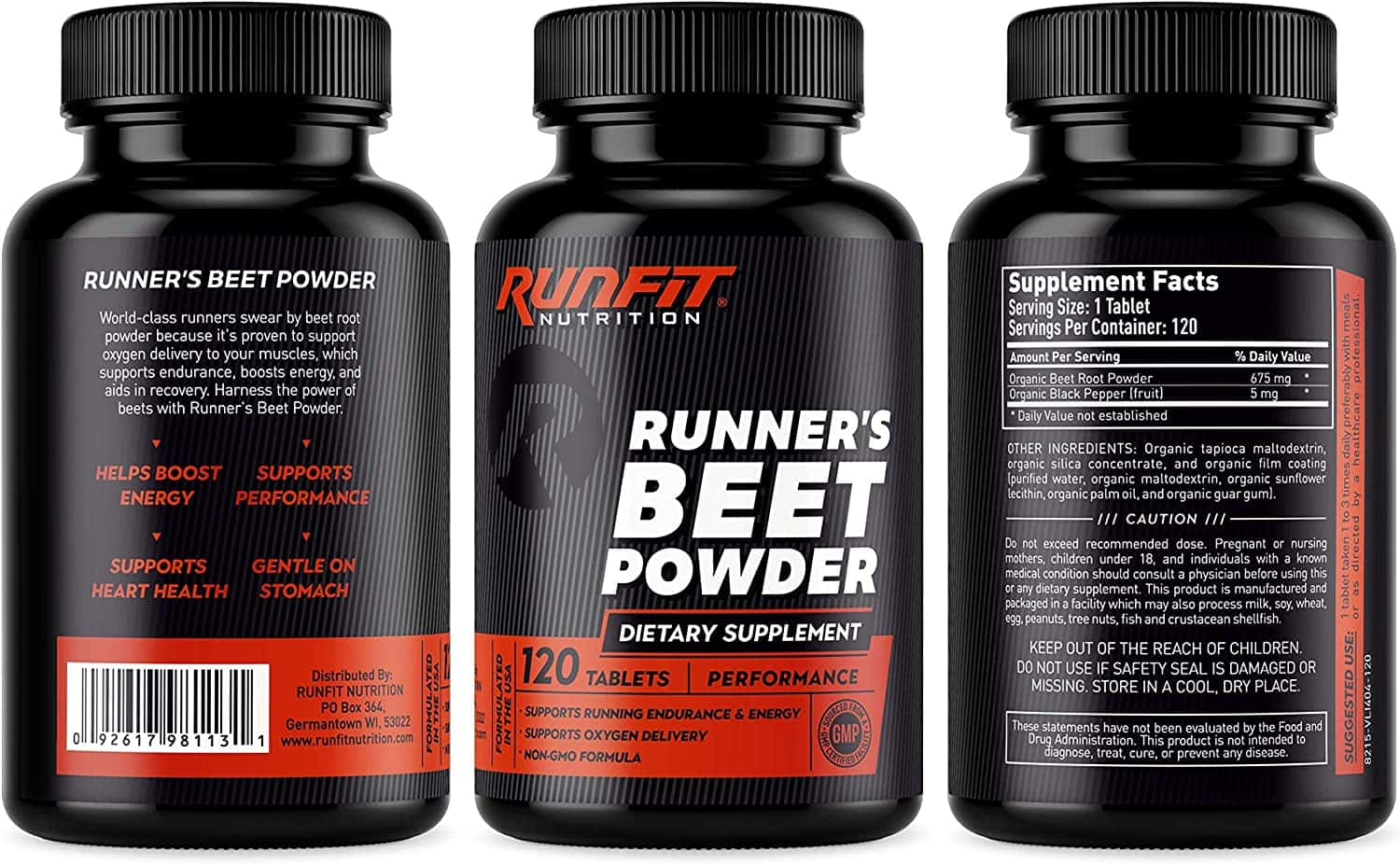
Boosts Energy, Endurance & VO2 Max
- Brand: Run Fit Nutrition
- Item Form: Tablet
- Flavor: Beetroot,Beet
- Product Benefits: Energy Management
- Package Information: Bottle
- Unit Count: 120 Count
- Number of Items: 1
- Dosage Form: Tablet
- Material Feature: Certified Organic
- Item Dimensions LxWxH: 2.5 x
Whole grains and legumes for sustained energy release

To sustain energy levels during runs and enhance recovery, organic whole grains and legumes should be staples in a runner’s diet. Whole grains like quinoa, brown rice, and oats offer complex carbohydrates that provide a steady release of energy, preventing blood sugar spikes and crashes. They are also rich in fiber, promoting healthy digestion and aiding in satiety. Legumes such as lentils, chickpeas, and black beans are excellent sources of plant-based protein, offering essential amino acids for muscle repair and growth. These organic powerhouses are also abundant in iron, magnesium, and B vitamins, which support oxygen transport, energy production, and overall vitality. By incorporating organic whole grains and legumes, runners can sustain their energy levels, optimize recovery, and fuel their bodies with nutrient-dense plant-based goodness.
Organic lean proteins for muscle repair and recovery
When it comes to muscle repair and recovery, organic lean proteins are a runner’s best friend. Organic sources of lean proteins, such as grass-fed beef, free-range poultry, wild-caught fish, and organic tofu or tempeh, provide the necessary amino acids to rebuild and repair muscles after intense workouts. These proteins are also rich in iron, zinc, and B vitamins, which play a vital role in oxygen transport, immune function, and energy metabolism. By choosing organic options, runners can ensure that they are consuming proteins free from antibiotics, hormones, and pesticides, thereby optimizing the nutritional quality of their meals and supporting their long-term health and performance goals.
Healthy fats from organic sources for optimal brain function
Contrary to popular belief, healthy fats are an essential part of a runner’s diet, particularly for optimal brain function and overall health. Organic sources of healthy fats, such as avocados, nuts, seeds, and extra virgin olive oil, are rich in omega-3 fatty acids and monounsaturated fats. These fats provide a steady source of energy, promote satiety, and support brain health and cognitive function. Organic avocados, in particular, offer a great combination of healthy fats, vitamins, and minerals, making them a fantastic addition to a runner’s diet. By incorporating organic sources of healthy fats, runners can nourish their bodies, improve mental clarity and focus, and maintain overall well-being.
Hydration through organic beverages
Proper hydration is crucial for runners, and choosing organic beverages can provide an extra layer of health benefits. Organic coconut water is a natural electrolyte-rich beverage that helps replenish essential minerals lost through sweat during intense workouts. It provides hydration while also delivering a hint of natural sweetness and refreshing flavor. Organic herbal teas, such as chamomile or peppermint, are hydrating alternatives to sugary drinks and provide additional benefits like relaxation and digestive support. Additionally, organic fruit-infused water or homemade organic sports drinks, made with natural ingredients
such as organic lemon, lime, and a touch of organic honey, can be excellent choices to stay hydrated during runs. These organic beverages not only quench thirst but also offer additional antioxidants and nutrients that support overall health and well-being.
By opting for organic beverages, runners can avoid the harmful additives, artificial sweeteners, and preservatives often found in conventional sports drinks and sodas. Organic options provide a clean and natural alternative, ensuring that runners are hydrating their bodies with pure and nourishing fluids.
Furthermore, it’s worth mentioning the importance of water as the ultimate hydrator. While not organic in nature, consuming filtered water from reliable sources ensures that runners are staying properly hydrated without the potential contaminants often found in tap water.
Incorporating organic beverages into a runner’s hydration strategy not only supports optimal performance but also aligns with the overall philosophy of organic sports nutrition – to fuel the body with pure, natural, and wholesome ingredients that enhance health and well-being.
In conclusion, key organic foods play a vital role in a runner’s diet. Organic fruits and vegetables provide essential vitamins, minerals, and antioxidants, contributing to overall health and performance. Whole grains and legumes offer sustained energy release and important nutrients for recovery. Organic lean proteins aid in muscle repair and growth. Healthy fats from organic sources support brain function and overall health. And finally, organic beverages, such as coconut water and herbal teas, provide hydration and additional health benefits.
By incorporating these key organic foods into their diet, runners can optimize their nutrition, reduce exposure to harmful chemicals, and support sustainable and environmentally-friendly farming practices. Choosing organic options ensures that runners are nourishing their bodies with the highest quality and most natural ingredients available.
It’s important to remember that while organic foods offer numerous benefits, personal preferences, dietary restrictions, and individual needs should also be taken into account when planning a runner’s diet. Consulting with a nutritionist or dietitian can provide valuable guidance tailored to specific goals and requirements.
In the next section, we will explore strategies for seamlessly incorporating organic sports nutrition into a runner’s daily routine, including meal planning and prepping, making organic choices when eating out or traveling, and utilizing organic supplements and snacks for on-the-go fueling. So, stay tuned for practical tips and insights on how to embrace organic sports nutrition as part of your running journey.
Conclusion
The results of numerous research studies have demonstrated that a healthy and regular diet during exercise and sports can have a significant impact on runners. Consequently, organic nutrition is recommended as a highly desirable approach and the best option for runners. Here, we will examine key findings from various aspects of organic nutrition for running:
- Nutrient Supply: Organic nutrition involves consuming natural foods without the use of toxins and chemical fertilizers. This type of nutrition can provide essential nutrients such as vitamins, minerals, antioxidants, and fiber in optimal amounts. These nutrients can increase energy levels, improve muscle strength, enhance the immune system, and enhance cardiovascular performance.
- Better Absorption: Organic foods generally contain fewer chemicals and genetically modified hormones. This enables better absorption of nutrients in the body. As a result, organic nutrition can contribute to increased energy production, improved endurance, and enhanced recovery time.
- Overall Health Maintenance: Organic nutrition can assist in maintaining the overall health of runners. Consuming organic foods means minimal preservatives and harmful substances in the body, leading to a better immune system and a reduced risk of illness.
- Environmental Support: Organic nutrition reduces the use of chemical fertilizers and toxins. This translates to a reduced negative impact on the environment, preserving soil health, wildlife, and decreasing greenhouse gas emissions. Therefore, organic nutrition plays a crucial role in environmental conservation and sustainability.
In summary, organic nutrition is recommended for runners as a healthy and sustainable approach. By providing the necessary nutrients, improving performance and endurance, maintaining overall health, and supporting the environment, runners can enhance their productivity and move closer to achieving their fitness goals.
Yes, choosing organic supports sustainable farming practices, reduces chemical pollution, and promotes biodiversity, contributing to a healthier planet.
Absolutely! Organic sports nutrition offers a variety of plant-based options, including protein powders, energy bars, and recovery drinks, suitable for vegan and vegetarian athletes.
Yes, organic options often include whole foods that support satiety and provide essential nutrients, contributing to healthy weight management for runners.
While organic products may have a slightly higher price tag, the investment in your health and performance is worthwhile, considering the quality of ingredients and their potential long-term benefits.
Yes, organic fuel can optimize race performance by providing sustained energy, supporting muscle function, and aiding in post-race recovery.
Table of contents
- The impact of organic food on overall health and performance.
- Importance Of Nutrition In Supporting Runners’ Performance And Recovery
- Quality in Organic Foods For Runners
- Whole grains and legumes for sustained energy release
- Organic lean proteins for muscle repair and recovery
- Healthy fats from organic sources for optimal brain function
- Hydration through organic beverages
- Conclusion
Contents
- The impact of organic food on overall health and performance.
- Importance Of Nutrition In Supporting Runners’ Performance And Recovery
- Quality in Organic Foods For Runners
- Whole grains and legumes for sustained energy release
- Organic lean proteins for muscle repair and recovery
- Healthy fats from organic sources for optimal brain function
- Hydration through organic beverages
- Conclusion
- Table of contents
